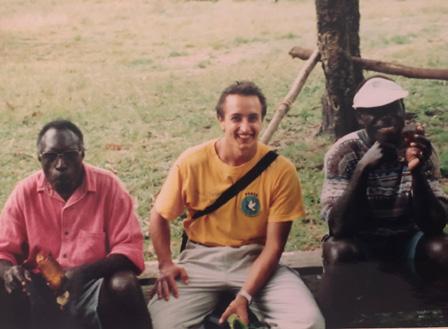
7 minute read
with the
from 2018-09 Sydney (1)
by Indian Link
welcoming place to be members. I think the solution needs to be a bottom up one.
PL: Right, so it’ll take time to evolve?
DS: Look, it will take time but I think that we do need to do better there, and I believe the prime minister and others very much recognise this challenge. It’s not going to be able to be fixed overnight, but we need to start moving in the right direction and I believe we are.
PL: Moving on to other things, it’s expected that there will be pressure mounted on from One Nation and others for an enquiry into population and immigration. What are your views on immigration and multiculturalism?
DS: My father was a migrant to Australia and Australia has been built upon the success of migration…
PL (interjecting): I believe your family was the only listing of ‘Sharma’ in the phone book in the 1960s…?
DS: My father tells me the story that when we first moved to Australia, yes, we were the only Sharmas listed in the White Pages of Sydney…
PL: … I understand that today, in certain areas of Sydney, there are more Singhs than Browns in the phone book.
DS (laughing): That doesn’t surprise me! Look, I think every generation of newly arrived migrants to Australia has brought new skills and strength to the country - and strength to the fabric of our society - and have integrated well into Australia and certainly made a great contribution to Australia. I think the recent wave of Indian migration particularly since the ‘90s when it really started to happen has made an immense contribution to Australia. So I support Australia continuing to be a country which is welcoming to migrants. It does well in integrating migrants into the multicultural fabric of our society, and it has a non-discriminatory policy towards migration. I would say though that we must recognise that there has been some degree of public unease about the rate of Australia’s population growth in recent decades, a decade or so. But it’s not so much about the population growth, but about the pressures on things like >
> infrastructure, roads, schools, housing, housing affordability. I think we need to find a way to make sure the migration is matched better to the needs of Australia. We’ve been talking in recent days about making sure migrants go to the areas where they are most needed, where their skills are most needed. We know parts of regional Australia - states or cities aside from Sydney or Melbourne - are desperately looking for new workers and families and more skilled professionals to come there. We need to find a way to make sure we balance the supply of migration with the demands that Australia has, and find a better way to match those.
PL: But keep the supply as is?
DS: Look, I think that should always be assessed on a case by case basis. The immigration intake is anywhere from the 150,000 – 250,000 mark a year, and historically that’s been about where we have been. But I think we should always be looking to fine tune and adjust the skills mix, the mix of humanitarian intake versus the skilled migration intake and the family reunion intake. And we also need to be cognisant of Australia’s own population growth driven by the birth rate of Australian citizens and find a way to manage it. I think Australia will continue to be a successful migrant country but we need to make sure it’s not just about the numbers we take in, it’s about how we handle those people when they arrive - making sure they’ve got jobs and communities to go to, and that the infrastructure is there to support them.
PL: It’s going to be a difficult magic pudding to put together.
DS: Yes it will be. These things aren’t easy but Australia has been doing this well now for many decades. You always need to fine tune policies and make adjustments based on a range of factors and be prepared to do so. You can’t get a range of policies and set them in stone. But I think we have been successful at this in the past and I’ve got no reason to doubt that we’ll continue to be successful.
PL: There have been some reports in the Australian Financial Review and the ABC about the role the media played in the political life of your predecessor Malcolm Turnbull. In fact he alluded to this himself. What are your thoughts on when the media, rather than being reporters, become players in the game itself?
DS: Pawan, I don’t think I want to comment on that too much. I am very focused on my own campaign in Wentworth which will be a very tough fight as you mentioned in the lead up. The media in a free society like Australia or India plays an important role in the political debate and public discourse in the country. We’ve got a very free and vibrant media here in Australia and they’ll continue to play an important role. But ultimately, politics is about the consent of the governed - about the public and the voting public - and that’s certainly what I’m focused on in my campaign, convincing the people of Wentworth that I’m the best candidate to represent them.
PL: Dave, let’s talk a bit about your Indian links. Do you know your name Devanand brings to mind a Bollywood heartthrob of the 1950s?
DS: I do, that’s exactly who I was named after. My father named me after him. Dad was an aspiring film star in London in the ‘50s and ‘60s but his parents as good Indian parents told him to give up that sort of stuff, to focus instead on becoming a lawyer, which he truly did.

PL: So he understands the issues of changing careers to achieve your dreams.
DS: Yes he’s responsible for my namehe’s a very big fan of Dev Anan
PL: Have you seen any of Dev Anand’s movies?
DS: I haven’t watched a movie in full but I’ve seen some clips on Youtube.
PL: Do you see a bit of yourself in him, you know, the tall gangliness, the dialogue delivery…?

DS: I’m not sure if I do. I wouldn’t be so immodest as to claim it. I’ll leave that to others.

PL: An Indian personality that has inspired you?
DS: To my mind, Gandhi is one of the most inspiring Indians, with his movement of non-violent resistance that he used to liberate India. Sunil Gavaskar, the cricketer, I know he’s not as well-known these days but he was a fabulous cricketer, a great role model for leadership. And then of course my father and his family as well who came to Trinidad and Tobago in the West Indies as migrants in the late 19th century and worked hard and saved and established a small business and sent my father, who is the youngest of nine children, off to London to receive a formal education. Their values of hard work and the importance they put on education, and on self-reliance, these are values that have very much informed my own approach to life.
PL: Read any books by Indian writers?
DS: I’m a big fan of VS Naipaul, a diaspora Indian. His book A House for Mr Biswas was about his own childhood and modelled loosely upon his father and his own frustrations as an aspiring Indian writer in Trinidad. I really enjoyed that book: it helped me understand my own father’s childhood in Trinidad and Tobago. Other than him there’s Arundhati Roy... I think Indian authors are some of the best out there in the English language at the moment
PL: Tendulkar or Bradman?
DS: Well I guess I’ve seen Tendulkar play, Bradman I’ve only ever seen on replays. If I have to choose the best batsman, I’d have to go for Brian Lara though, a Trinidadian and a West Indian. I did see him play, and I think he is one of the most fabulous cricketers of his generation, and certainly of the modern era.
PL: Priyanka Chopra and Nicole Kidman?
DS: I’m more familiar with the work of Nicole Kidman, but I wouldn’t pick favourites.
PL: Ever been to India?
DS: Yes but I haven’t spent long enough. I’ve spent much more time in Trinidad and Tobago where most of my father’s family is. I am intending at some point to make a long trip to India and get to know the country much better than I do.

PL: What’s your favouring order at an Indian restaurant in Sydney? Your boss, the current PM, answered that question here on Indian Link Radio as ‘Sco-mo-sas’. DS (laughing): Did he? I always like a Rogan Josh. I also like a chicken vindaloo, the spicy one. I love Indian flatbreads - naan, garlic naan, chapattis and rotis. My oldest daughter Diana has got quite a taste for spicy food. So she’s signed up. The younger two still need to have their tastebuds acclimatised. But they all enjoy dal. My dad makes them dal in the winter and they’ll always enjoy a cup. And of course they all like basmati rice.
PL: Introduce them to butter chickenthat’s the easiest way to get them across the line.
DS: I agree butter chicken is the best introduction for children!
DS: Finally, Dave, your message for Indian Australians who may be having a very jaundiced view of Australian politics at the moment?
DS: I’d say to them that I can understand their jaundiced views. And to get involved would be my message to them. Play a part. Indian Australians make a tremendous contribution to Australia and have over the last few decades. Increasingly, we should be seeing Indian Australians in public life and not just in the commercial sphere and as professionals. I would like to see more Indian Australians getting involved in public life. I was one of the first Indian Australian ambassadors, (like) Peter Varghese who is also a leading light in the Indian Australian community. But that’s the way we help improve politics in Australia. By people getting specifically involved. So if people are frustrated, and I can understand they are, then, you know, do something and become active. Join the Liberal political party, support your local member, put your views forward on issues. That’s what politics is all about and what it should be about - improving the lives of people. We can only get better politics if we get better citizens involved.











